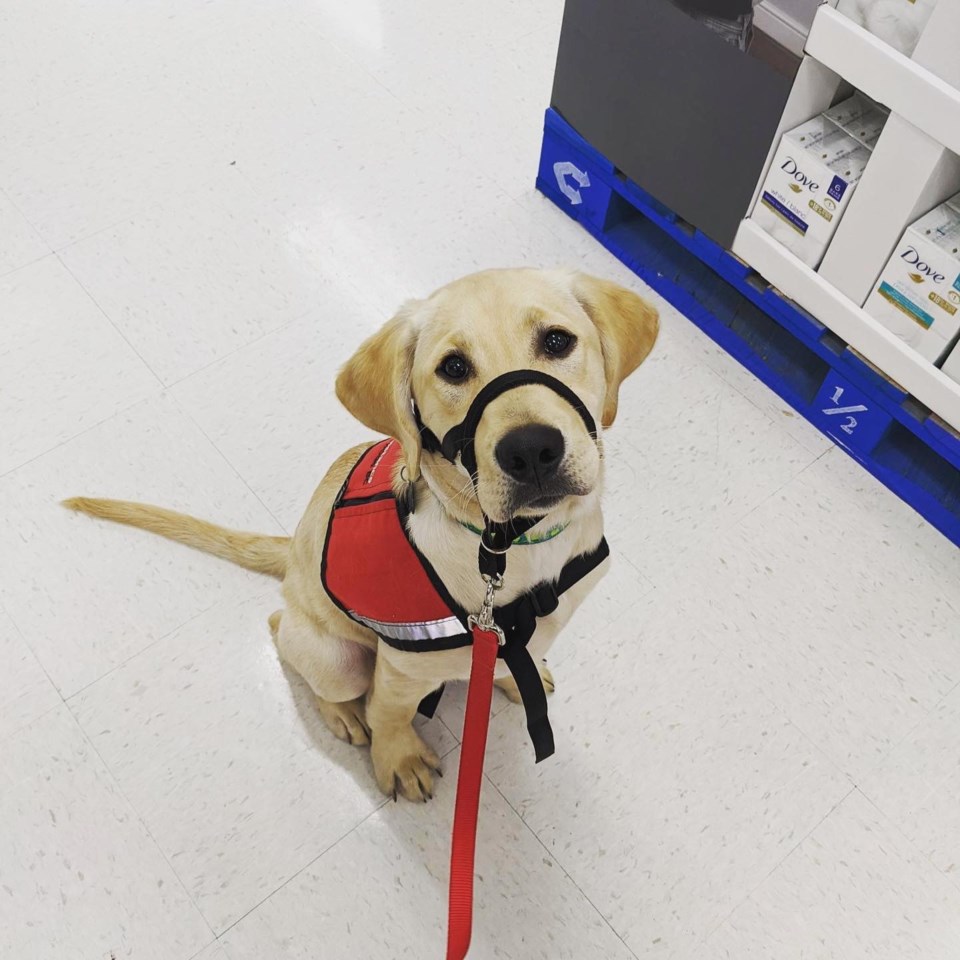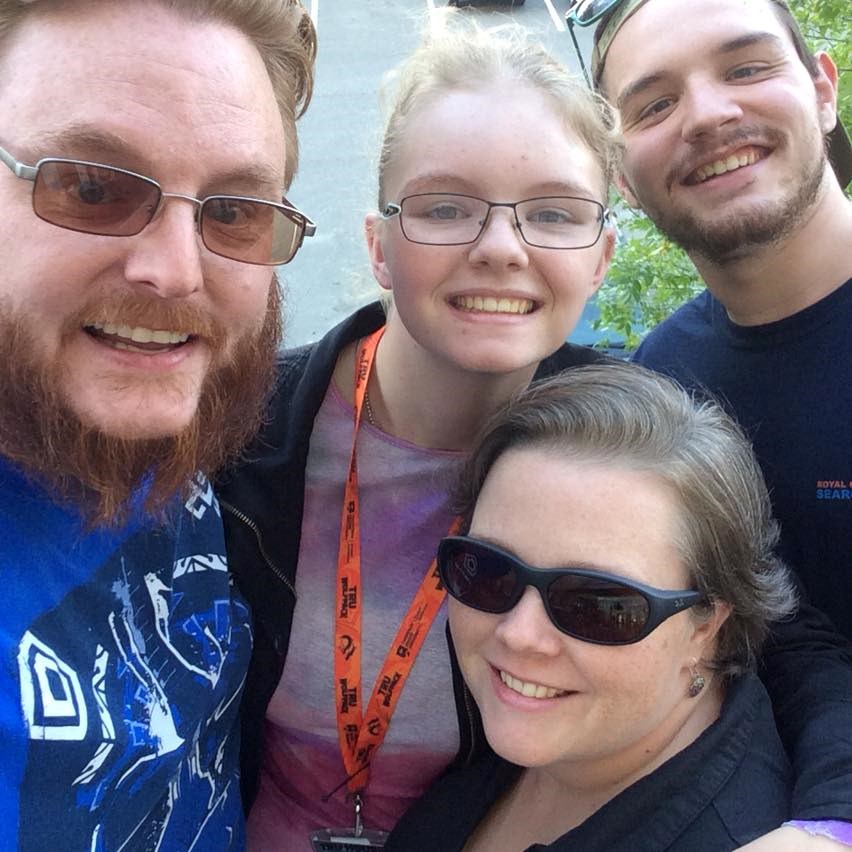Editor's note, this story deals with thoughts of suicide. If you are in crisis, please call: 1-866-661-3311, go to crisiscentre.bc.ca online or head to the Squamish emergency department.
Corianna Underwood, 20, doesn't quite remember a time when her dad, Mike, didn't suffer from post-traumatic stress disorder (PTSD), which he has had since she was 13 years old.
"It is definitely hard," she said.
She said trying to figure out what about his personality is him and what is the disorder is the most challenging.
"Is that actually my dad saying that? Or is that the disease itself?"
Underwood said that on the plus side, having a father with a mental illness has helped her be more compassionate with others, like friends, who she recognizes are struggling with their mental health, too.
Underwood recently launched an online fundraising campaign, "Service dog to help man with PTSD" to help her dad with his affliction. The specially trained dog costs $25,000. (There are organizations that provide PTSD dogs for free to veterans, RCMP members and the like, but they don't supply them for civilians.)
"My dad's been trying to get a service animal for a few years now, but between costs and that his current complex doesn't allow dogs, and other little issues have been preventing him," she said. "He legally just got the go-ahead from the complex, so basically everything has been cleared up, except the cost."
Underwood said her parents are not the type to ever ask for help, so she is stepping forward with the online campaign.
"He needs this service animal," she said.
The elder Underwood told The Chief he developed PTSD in 2013 while working as the head of security for a private security company with a hotel chain in Vancouver.
"It was my job to ensure that the 'unpleasant' issues that happen in a hotel aren't revealed to the public," he said. "I dealt with everything police officers do, however, didn't have the support or resources offered to first responders."
The hotel he worked at was ground zero during the 2011 Canuck riots.
Inhis security role he answered calls for fatalities — everything from seniors dying naturally to suicides. He dealt with domestic assaults, fires, gang violence, and more.
"I dealt with issues that would horrify anyone," he said.
His personality is naturally outgoing.
He's been in Between Shifts Theatre productions and has been president of the Sea to Sky Toastmasters club.

He's also a comedian, though he hasn't taken to the stage recently.
"Unfortunately, the combination of PTSD and quarantine have put the kibosh on that for the foreseeable future," he said.
PTSD can be debilitating, with bouts of panic attacks that he says make him "almost catatonic."
"The best way to explain it to someone is, trying to write an article while your laptop switches images, screens and sounds every microsecond. Images, sounds, memories, thoughts flash through my mind so quickly it's impossible to grasp on to one specific one or hold onto one."
Trusting the public is difficult.
"I find myself hyper-vigilant. Crowds cause me... a genuine sense of fear. Like something is stalking me."
He gets adrenaline rushes, as if he has been startled, that last for many hours.
"It's exhausting. These adrenaline rushes can happen at any time whether I'm watching TV or walking in the estuary. There are times when I feel like my old self but then my brain starts to splinter into incoherent panic attacks."
He has felt suicidal at times, just wanting the pain in his brain to stop.
COVID-19 has not helped.
"Unfortunately, the first few months of COVID-19 restrictions were in direct contradiction to what I needed to fight my affliction," he said, adding access to socializing, outside fresh air, counselling and exercise were all restricted.
He hasn't seen a mental health professional in person in six months.
"Mental health is difficult to talk about. It's even more difficult to compete for resources/support during a pandemic," he said. "All focus is on COVID-19. In the rush to quarantine, many of us were left behind," he added.
"Being locked in your house alone leads to dark places for the best of us, those who were already in crisis when quarantine started were left to their own devices for a long time. Recovery has been set back quite a bit."
Getting a service dog is the last of many treatments he has sought, Underwood says.
He has undergone cognitive behavioural therapy, various medications, support groups, readings, exercises and more.
"I feel like I'm running out of options," he said.
A service dog is so much more than a furry friend.
"I'm not looking for an emotional support animal. I need a specially trained professional dog to help me manage my issues so I can function again. It'll give me routine and companionship and support."

The dogs and the cost
Marie Krzus, with Assistance Service Dogs BC, a small not-for-profit branch of Obedience Unleashed Dog Training says the process of getting a dog through her organization involves applying with the endorsement of a doctor.
Her organization specializes primarily in autism service dogs, but also offers multipurpose dogs for emotional and physical support.
After a follow-up meeting, it takes from six months to up 24 months to acquire a trained dog.
"We do believe in the importance of an applicant meeting a dog and seeing that chemistry," she said, adding that matching the energy of the applicant and the dog is key.
An applicant may have visits with several dogs to find the best fit, she said.
Krzus said there is a misperception that service dogs are free.
"They are not. From our organization, our perspective, it takes years to train a service dog and once we place a service dog, that isn't the end of the relationship. That is just the beginning of the relationship. We are going to be there working with you and for you for the working lifetime of a dog."
Ongoing training will be required, she said.
To donate to Underwood's campaign, go here.




